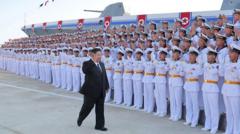As the 80th Victory Day approaches, Russian-occupied areas like Bakhmut experience muted festivities amid destruction. Soldiers mark the occasion with posters and videos, but the abandoned landscapes tell a different story.
A Somber Victory Day in Russian-Occupied Eastern Ukraine

A Somber Victory Day in Russian-Occupied Eastern Ukraine
The 80th anniversary of Victory Day in occupied Ukrainian territories reveals a stark contrast between celebration and devastation.
In a muted celebration of the 80th anniversary of Victory Day, the Russian-occupied city of Bakhmut in eastern Ukraine stands as a stark symbol of war's devastation. Originally home to approximately 70,000 residents, the city now resembles a bombed-out ghost town. Russian soldiers stationed there eagerly shared videos on social media, depicting the hanging of colorful posters celebrating the day that marks the surrender of Nazi Germany. Messages of pride and Soviet nostalgia filled the screens, accompanying images of veterans who fought decades ago.
Despite the displays of enthusiasm, the reality of Bakhmut's barren streets tells a contrasting story of desolation. With most residents long gone due to the conflict, the planned festivities appear more ceremonial than celebratory. City officials, aligned with the Kremlin, announced plans for over 57,000 commemorative events across the Donetsk region, including concerts and parades that serve as reminders of the land’s Soviet past and a display of Russian occupancy.
In contrast, celebrations in Russia itself are projected to be grandiose, highlighted by a military parade in Moscow demonstrating the strength of Putin's regime. The emphasis on tradition and symbolism reinforces a narrative of Russian resilience and power, suggesting that while the war rages on, the ideology underpinning the celebrations remains firmly rooted in the Soviet legacy.
In the end, Victory Day in the occupied territories encapsulates a complex message, blending a sense of pride with sobering reality; honor is paid for historical victories amidst the ruins of modern conflict, revealing how war shapes both memory and identity in these embattled regions.




















